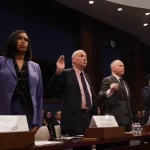
Common words such as “husband” and “wife” are offensive and should be avoided, according to one church in Britain.
The Methodist Church in the United Kingdom has released its own “Inclusive Church Language Guide” in which parishioners are urged to avoid certain words on the basis that their usage makes “assumptions” about one’s family life.
“As Christians, we need to have the courage for conversations that can sometimes be difficult, to recognize that we sometimes exclude people, to listen with humility, to repent of any hurtful language or imagery and to take care with how we listen and what we say, write or depict, in the Spirit of Christ,” the statement from the church began.
“There is infinite variety in the way that God’s creation is expressed in human life,” the guide explained. “This is worth bearing in mind as we speak and write.”
“Terminology such as ‘husband’ and ‘wife’ may sound inoffensive, but it makes assumptions about a family or personal life that is not the reality for many people.
Trending:
“The words ‘parent,’ ‘partner’ and ‘child’ are a good place to start. ‘Carer’ is also a neutral yet understandable way to refer to the primary carer of a child, who may or may not be their parent.”
.@MethodistGB brands terms ‘husband’ and ‘wife’ offensive.
This is not Christianity. It is Critical Theories: ‘smash heteronormativity.’
It is no longer enough to acknowledge disordered lifestyles. Everything normative and ordered must be demolished for fear of causing offence. pic.twitter.com/8OaUgMH6Nc
— Fr Calvin Robinson (@calvinrobinson) December 28, 2023
Other terms such as “brothers and sisters” are also unacceptable on the grounds that it “doesn’t take into account our nonbinary friends.”
Do you support the this language restriction?
Yes: 1% (5 Votes)
No: 99% (915 Votes)
“You might consider using ‘siblings,’ ‘friends’ or ‘children of God’ instead. Similarly, using ‘he or she’ could be exclusive; ‘they’ is also accurate and acceptable,” it said.
The guidance, which will be updated twice a year, explained that using “inclusive language” is “key to effective ministry and mission.”
“Part of the work of being a justice-seeking Church is about recognizing and acknowledging that harm has been done to marginalized groups in the past, not just by wider society but at times by the Church itself, and that it is the Church’s responsibility to make amends for this,” it explained.
“It is crucial for our communications to be sensitive and inclusive because for such a long time, some groups have been marginalized and/or demonized by common culture.
“The Church can lead the way in acknowledging the hurt caused to marginalized communities by living out the ‘good news’ that God includes us all, whoever we are.”
If you’re thinking of getting married in a Methodist Church, you’ll be able to have a conversation with the minister to make sure the ceremony reflects who you are.
Our Inclusive Language Guide helps us hold good conversations. Watch Lou and Jackie talk about planning a wedding… pic.twitter.com/0BwGpubCNL
— The Methodist Church (@MethodistGB) December 19, 2023
Other areas in which members are urged to abide by the language of exclusivity include topics such as ageism, anti-racism, immigration status, Islamaphobia, the disabled and even slavery.
Meanwhile, those looking for further resources are advised to look up a variety of far-left organizations including Stonewall, All About Trans and Racial Equity Tools.
The latest recommendations are not the first time that blatantly anti-Christian reforms designed to accommodate the LGBT community have been implemented at the behest of the church’s governing body.
In 2021, the church voted overwhelmingly to redefine marriage to include homosexual couples and officiate same-sex weddings, according to the BBC. However, it is not permitted in the Church of England or the Roman Catholic Church.






